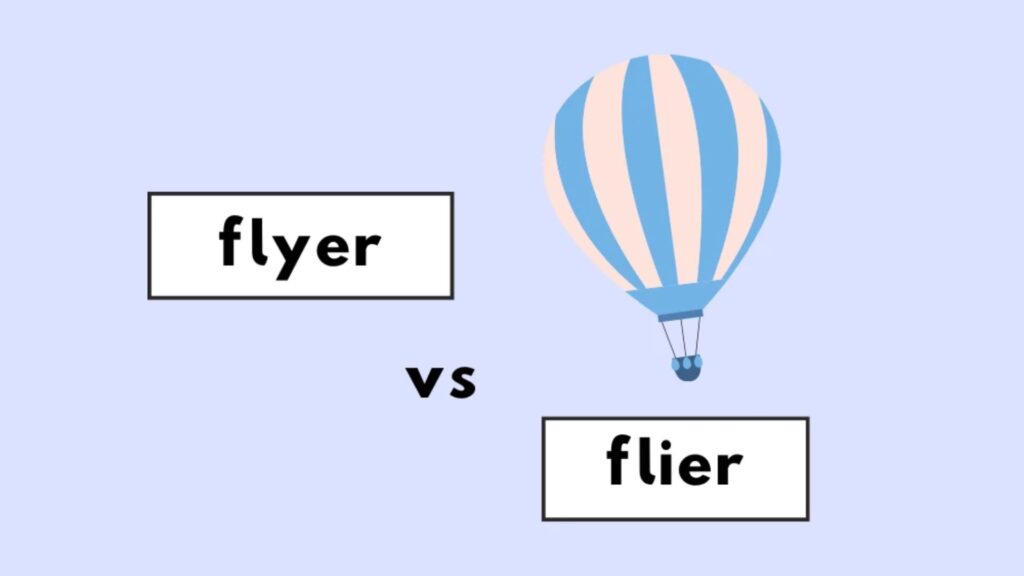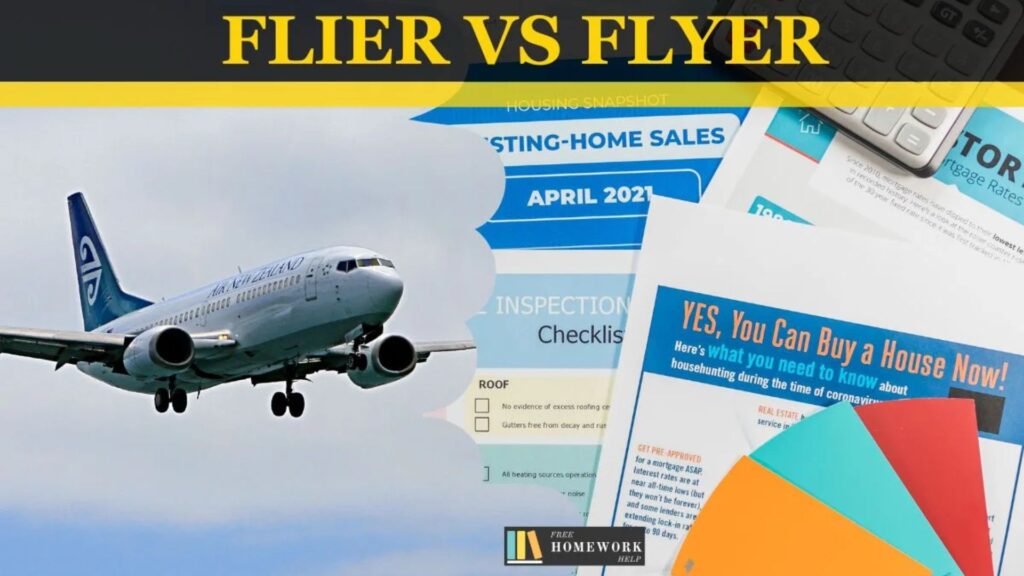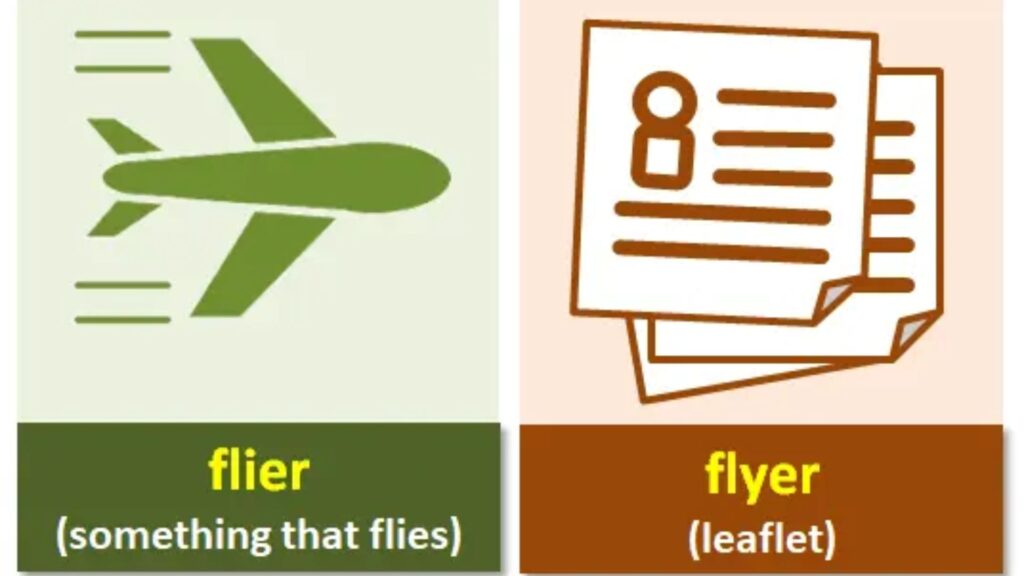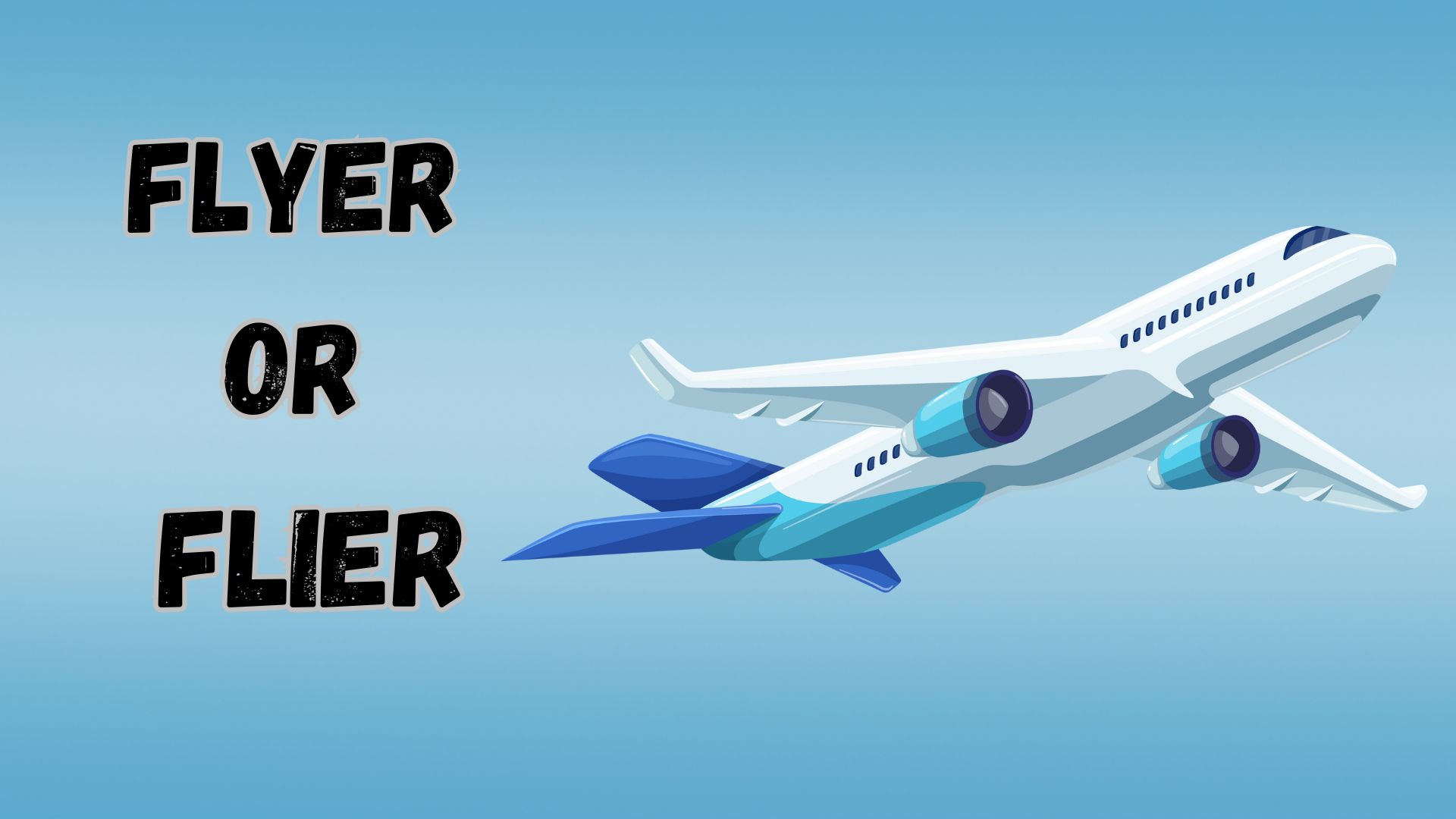You’ve probably come across both “flyer” and “flier” maybe on a printed event handout, an airline promotion, or a grammar blog. But which one is actually correct? Is there even a difference? Let’s dive in and settle this once and for all.
Spoiler: Both are correct but not always interchangeable.
The Spelling Dilemma: Flyer vs. Flier

In modern English usage, “flyer” and “flier” are both considered correct spellings of the word. However, the context in which each one is used often determines the “preferred” form.
📢 Flyer in Promotional and Marketing Contexts
If you’re talking about a printed handout, brochure, or pamphlet the kind you pass out at concerts or tape to a college bulletin board—“flyer” is almost always the correct spelling.
✅ Example:
Hi Chloe,
We’ve attached a flyer for this weekend’s local art showcase at Riverside Park. Feel free to share the handbill with your friends and family.
Cheers,
LocalBuzz Events Team
In the world of print marketing, “flyer” is the dominant spelling used by advertisers, designers, and even tech platforms offering templates for event promotion.
✈️ Flier in Aviation and Travel Contexts
On the other hand, “flier” tends to be the go-to spelling when referring to air travel, aviators, or frequent fliers.
Southwest Airlines, for instance, uses “frequent flyer program” in branding, but aviation purists and traditionalists often lean toward “flier” in professional or literary settings.
✅ Example:
Dear Jason,
As a frequent flier, you’ve earned 3,000 bonus miles this quarter! Thanks for choosing Reno-Tahoe International Airport for your travels. We value your loyalty to our airline partners.
Safe travels,
The WanderLust Rewards Team
In aviation contexts, “flier” has roots tracing back to World War I, when the term referred to daring aviators or pilots risking their lives in experimental aircraft.
What Do the Dictionaries Say?
Here’s where things get even more interesting:
- Merriam-Webster lists both spellings and suggests that “flyer” is more common in American English, especially for promotional material.
- Oxford English Dictionary leans toward “flyer” but acknowledges “flier” as a valid variant especially in the aviation world.
🧠 Etymology & Word Origin: Where Did They Come From?

Both “flyer” and “flier” originate from the verb “to fly,” but over time, their spellings evolved along slightly different paths. “Flyer” was likely influenced by the same suffix pattern seen in brochure, pamphlet, or catalogue words tied to printed advertising and distribution.
Meanwhile, “flier” stayed closer to older English forms and idiomatic expressions like “take a flier,” which means to take a risky chance, often used in business or career contexts.
💼 What About “Take a Flier” or “High-Flier”?
Here’s where it gets even more nuanced.
- “Take a flier” is a common idiom in financial and professional settings. It refers to taking a bold or risky gamble on a startup, investment, or idea.
- “High-flier” (or “highflier”) describes someone with extravagant ambition or someone climbing rapidly up the career ladder.
✅ Usage:
After law school, Ava took a flier on a risky tech startup instead of joining a major firm. Turns out, that gamble paid off she’s now a highflier in the legal tech industry.
Note how “flier” still clings to that daring, airborne metaphor, while “flyer” sticks more to physical objects concert flyers, advertisements, or throwaways.
📰 Media Style Guides & Real-World Usage
Even major publications don’t always agree:
- The Los Angeles Times tends to use “flyer” for printed materials.
- Some airlines and government agencies use “flier” for passengers or travel-related references.
- Microsoft Word often autocorrects to “flyer,” favoring that as the dominant US English spelling.
Here’s a good rule of thumb:
“Flyer” is for paper. “Flier” is for people.
Not perfect but helpful.
📬 Real-Life Scenarios: Which Spelling Should You Use?
🎟️ Scenario 1: Promoting a Concert
“We need to design a flyer for next weekend’s jazz night at The Velvet Lounge. Let’s include the performers, drink specials, and ticket prices.”
Use “flyer” here it’s an advertisement that will be printed, posted online, and handed out.
🛫 Scenario 2: Talking About a Frequent Traveler
“Jake’s a real frequent flier he practically lives in the sky. I swear the airline staff at New York’s JFK knows him by name.”
In this case, “flier” aligns more closely with historical usage in aviation and fits common idioms.
🧾 Scenario 3: Business Idioms and Risk
“I took a flier on a side hustle during the pandemic, and it turned into a six-figure business.”
Here, “flier” represents a career risk, not something you’d print and distribute.
🔄 Plural of Flyer or Flier

Regardless of spelling, the plural forms are straightforward:
- Flyers – more than one printed advertisement or handout
- Fliers – multiple travelers or individuals who fly often
Example:
“We printed 500 flyers for the product launch.”
“Our airline rewards over 10,000 fliers each year.”
🛠️ Tips for Writers & Marketers
Here’s how to decide which spelling to use in your own writing:
| Context | Use “Flyer” | Use “Flier” |
|---|---|---|
| Printed advertisement | ✔ | ✖ |
| Event promotion | ✔ | ✖ |
| Referring to a traveler | ✖ | ✔ |
| Aviation or airshow setting | ✖ | ✔ |
| Idioms or risk-taking language | ✖ | ✔ |
| Microsoft Word / Most U.S. Style Guides | ✔ | ✔ (less common) |
🧩 Final Thoughts: Choose Wisely, But Stay Consistent
In short, there’s no absolute winner in the flyer vs. flier debate. Both are correct, but each suits a different tone, industry, or context.
- Talking about a pamphlet? Use flyer.
- Referring to a pilot or frequent traveler? Go with flier.
- Writing a formal document or ad? Pick one and stick with it throughout.
Words evolve, and so do their meanings but knowing when and how to use them correctly sets your writing apart.

